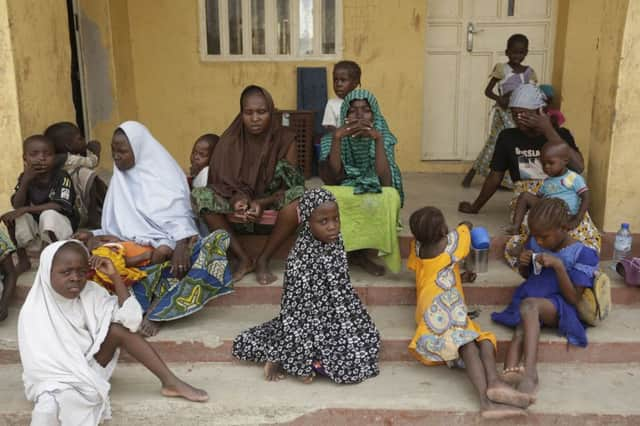Women freed from Boko Haram given food and care


The group of 275 women and children are among the nearly 700 freed in the past week by the Nigerian military from Boko Haram extremists and the first to be transported to the safety of a Malkohi refugee camp in Yola in the country’s north-east.
Officials yesterday were still registering the 61 women and 214 children, almost all girls. Many critically malnourished babies and children have been put on intravenous drips in the clinic and 21 have been hospitalised for gunshot wounds and fractured limbs, said a camp official.
Advertisement
Hide AdAdvertisement
Hide AdThrough interviews, the officials are trying to determine where the women and children are from.
It does not appear that any of those released are from the group of more than 200 schoolgirls kidnapped by Boko Haram a year ago from the town of Chibok, said an official.
“Based on registration we have carried out so far, none of them is from Chibok,” said Zakari Abubakar, Malkohi camp team leader for the national emergency management agency. Almost all are from Gumsuri village near Chibok and which had been attacked many times in the past year, said Abubakar.
The women and children were rescued by the military from the Sambisa Forest, the last stronghold of the Islamic extremists, and had to travel for three days on the open backs of military trucks to reach the safety of Malkohi camp.
The Nigerian military said the women and girls were freed when soldiers destroyed more than a dozen insurgent camps.
President Goodluck Jonathan, whose term ends this month, said on Thursday that the forest is the last holdout of the Islamic militants and he pledged to “hand over a Nigeria completely free of terrorist strongholds”.
It is unclear how many girls, women, boys and men Boko Haram has kidnapped during its six-year rebellion. Nigeria’s army has only reported rescuing only females.
On Saturday night, when the women arrived at the camp, they appeared exhausted and too distressed to realise they were safe, or to be questioned about their experiences. They lined up for tea, water and a stew of baobab leaves.
Advertisement
Hide AdAdvertisement
Hide AdThey were taken captive when Boko Haram seized a large swath of north-eastern Nigeria last year, declaring it an Islamic caliphate. Nigerian troops ran away before their advance, complaining they were not given enough ammunition or food to fight, and leaving civilians with no defence against an uprising that killed as many as 10,000 people last year. Some 1.5 million people have been driven from their homes.
The tide has turned in the past nine weeks with a new infusion of weapons including helicopter gunships, and a coalition with neighbouring countries that brought in troops from Niger, Chad and Cameroon.
A counsellor who has helped rehabilitate women held captive by Boko Haram said that some have identified with the extremist ideology after months of captivity and forced marriages.
Some of the freed women and girls are pregnant, Muhammad Gavi, a spokesman for a self-defence group that fights the terror group said.
Amnesty International called on authorities “to ensure that the trauma of those ‘rescued’ is not exacerbated by lengthy security screening in detention”.